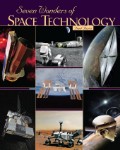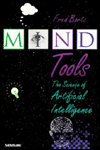My catch-up science book blogging continues with a selection of titles released in the first three months of 2019
My usual caveat: I haven’t read all of these in detail, but they are published by reputable publishers and written by credible authors. I have browsed them enough to recommend picking them up from a library or bookstore shelf.
I’ll start with a January title from Prometheus Books that I certainly would have been consulting if it was available when I was writing my book for young readers  Seven Wonders of Space Technology. Rod Pyle’s paperback original and ebook
Seven Wonders of Space Technology. Rod Pyle’s paperback original and ebook  Interplanetary Robots: True Stories of Space Exploration covers six decades of failure and spectacular discovery in exploring the worlds of the Solar System. I would quibble that the New Horizons Spacecraft, which produced remarkable knowledge of the Pluto-Charon planetary system, deserves more than a brief mention. (The book went to press before New Horizons’ magnificent second act flyby of the Kuiper Belt object nicknamed Ultima Thule, which makes its omission even more regrettable.) Still my first law of reviewing is to critique the book that the author wrote rather than the one I might have preferred. By that standard, Pyle’s choices are worthy of praise.
Interplanetary Robots: True Stories of Space Exploration covers six decades of failure and spectacular discovery in exploring the worlds of the Solar System. I would quibble that the New Horizons Spacecraft, which produced remarkable knowledge of the Pluto-Charon planetary system, deserves more than a brief mention. (The book went to press before New Horizons’ magnificent second act flyby of the Kuiper Belt object nicknamed Ultima Thule, which makes its omission even more regrettable.) Still my first law of reviewing is to critique the book that the author wrote rather than the one I might have preferred. By that standard, Pyle’s choices are worthy of praise.
The same day that Interplanetary Robots appeared, the publisher also debuted  Remembering: What 50 Years of Research with Famous Amnesia Patient H.M. Can Teach Us about Memory and How it Works by Donald G. MacKay, a psychologist who worked with Henry Molaison, who was the victim of epilepsy surgery gone wrong. From the day of the surgery at age 27 and for the rest of his life, the patient could no longer form new memories. He became an inadvertent though valuable experimental subject who taught brain scientists about the brain system that forms, stores, and recalls memories. This book not only discusses the research but also fulfills McKay’s promise to Henry that he would use his misfortune to help other people.
Remembering: What 50 Years of Research with Famous Amnesia Patient H.M. Can Teach Us about Memory and How it Works by Donald G. MacKay, a psychologist who worked with Henry Molaison, who was the victim of epilepsy surgery gone wrong. From the day of the surgery at age 27 and for the rest of his life, the patient could no longer form new memories. He became an inadvertent though valuable experimental subject who taught brain scientists about the brain system that forms, stores, and recalls memories. This book not only discusses the research but also fulfills McKay’s promise to Henry that he would use his misfortune to help other people.
February books include one from elite athlete and FiveThirtyEight lead science writer Christie Aschwanden,  Good to Go: What the Athlete in All of Us Can Learn from the Strange Science of Recovery. The publicity copy reminds me of
Good to Go: What the Athlete in All of Us Can Learn from the Strange Science of Recovery. The publicity copy reminds me of  books by Mary Roach, who combines science with humor and human curiosity. “From infrared pajamas and sleep trackers to ice packs and cryochambers, Anschwanden investigates the claims of these recovery services and products–even subjecting herself to some of these methods–and dives into the scientific evidence to answer the question of how the body can best rebound and recover from athletic training and achieve peak performance. [She] cuts through the hype and separates what’s helpful from what is probably useless (and what might actually be harmful).”
books by Mary Roach, who combines science with humor and human curiosity. “From infrared pajamas and sleep trackers to ice packs and cryochambers, Anschwanden investigates the claims of these recovery services and products–even subjecting herself to some of these methods–and dives into the scientific evidence to answer the question of how the body can best rebound and recover from athletic training and achieve peak performance. [She] cuts through the hype and separates what’s helpful from what is probably useless (and what might actually be harmful).”
Another February book is targeted to readers trying to make sense of our rancorous and fractured politics. Touted as “An evolutionary psychologist traces the roots of political divisions back to our primate ancestors and male-dominated social hierarchies,” this paperback original titled  Sex, Power, and Partisanship: How Evolutionary Science Makes Sense of Our Polical Divide by Hector A. Garcia might give you something to argue about with friends who share your interests if not your opinions in politics.
Sex, Power, and Partisanship: How Evolutionary Science Makes Sense of Our Polical Divide by Hector A. Garcia might give you something to argue about with friends who share your interests if not your opinions in politics.
More than twenty years ago, I wrote a book for young readers that described the burgeoning field of artificial intelligence, calling it  Mind Tools. It included a chapter on decision support systems, with a focus on medical diagnosis programs and databases that helped physicians identify conditions that they might not be fully familiar with. Today, when doctor-patient contact has become much more technological and much less personal, AI has broader applications in medicine, including the ability to read scans and images. New science books for March of this year include
Mind Tools. It included a chapter on decision support systems, with a focus on medical diagnosis programs and databases that helped physicians identify conditions that they might not be fully familiar with. Today, when doctor-patient contact has become much more technological and much less personal, AI has broader applications in medicine, including the ability to read scans and images. New science books for March of this year include  Deep Medicine: How Artificial Intelligence Can Make Healthcare Human Again by leading cardiologist and researcher Eric Topol.
Deep Medicine: How Artificial Intelligence Can Make Healthcare Human Again by leading cardiologist and researcher Eric Topol.
The book’s publicity overstates the case when it describes modern medicine this way: “Medicine has become inhuman, with disastrous effects. The doctor-patient relationship is broken: doctors are too overwhelmed to connect with their patients, prescriptions are valued over prevention, and medical errors and misdiagnoses abound. Despite having increased access to technology, doctors continue to be vulnerable to distraction, data overload, and the demand to maximize profits by seeing more and more patients.” Still enough of that rings true to justify the publisher’s claim that “we are now at a turning point, when artificial intelligence–if properly harnessed–will allow doctors to give their patients more focused and empathetic care. The latest research shows that advances in AI, in particular deep learning, will transform the way doctors diagnose illness, streamline healthcare systems, and empower patients.” If you are interested in the interface between technology and medicine, this looks like an interesting and challenging book.
Finally, we offer a book that examines the thinking of important historical figures in the context of today’s increasingly authoritartan political environment. Philosophy professor and author Robert P. Crease’s thesis is summarized in the subtitle of  The Workshop and the World: What Ten Thinkers Can Teach Us About Science and Authority. The back cover blurbs all emphasize its timeliness and urgency, including this from Peter Woit (author of Not Even Wrong): “We live in a frightening time of assault on the notion of ‘truth’ and authority. Crease’s historical account of the relationship between the public and the expert sheds important light on our current predicament.”
The Workshop and the World: What Ten Thinkers Can Teach Us About Science and Authority. The back cover blurbs all emphasize its timeliness and urgency, including this from Peter Woit (author of Not Even Wrong): “We live in a frightening time of assault on the notion of ‘truth’ and authority. Crease’s historical account of the relationship between the public and the expert sheds important light on our current predicament.”
I will be back next month with another roundup of books from April and May, and perhaps a look ahead to June.
Blogger and reviewer Fred Bortz is the author of numerous science books for young readers.
A request from the blogger:
Please let me know you appreciated this posting by adding a comment or sending an email with your thoughts to [email protected] . Many thanks!

Excellent description of these books. I hope to read some of them. Thanks